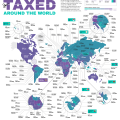Moving to another country is always a daunting experience, which can be exhilarating and stressful in turn. You always have a lot of paperwork to deal with, you are probably in constant communication with your new workplace making sure the transition is smooth, plus you may have to figure out your living situation and deal with things like housing or rentals.
Amidst all this, it’s always important to acclimatize yourself to the laws that will now apply to you as a worker in America. Depending on your visa status — whether you are a permanent worker or a temporary worker — the subtleties or specifications of the rules may differ, but the general application will remain the same regardless of your immigration status.
In this article, we will discuss 5 laws that are most pertinent to the work-life in the USA and share tips with you on how to navigate them.
5 Laws to Know When Moving to the USA for Work
- Tax Laws
US tax laws are many and complicated. While you’ll need the help of a professional tax specialist to understand these myriad laws, here are a few introductory points to give you an idea of the basics.
- As a worker in America, you’ll be taxed by the government on federal, state, and local levels. While local and state tax laws vary, the federal tax laws apply to all US workers.
- The federal income tax rate ranges from 10% to 37% of the taxable income. This is a progressive system so the more you earn, the higher tax you pay.
- While American taxpayers are familiar with the federal income tax, there are other taxes that you may be required to pay. These include capital gains tax, social security tax, medicare tax, and more. Check with a tax specialist to learn what applies to you.
- Taxable income includes income sources that are both earned (salary, wages, tips, and commissions, etc.) and unearned (dividends, interest, and royalties, etc.).
- Taxable income can be reduced by taking advantage of deductions, tax credits, and exemptions. Again, a tax specialist can tell you what you are eligible for, so get in touch with one come tax filing season.
For more details on federal income tax, here is a great resource by FindLaw. To learn about your tax payments for state and local taxes, consult their respective websites.
- Labor Laws
American labor laws are some of the most worker-friendly in the world. While acknowledging the need to improve these laws even further, it’s important to recognize the many laws that protect the rights and freedoms of American workers.
One of these rights is entrenched in the Civil Rights Act of 1964 which prohibits discrimination of employees based on factors like race, color, religion, sex, or national origin group. Other federal laws like the Labor Relations Act or the Occupational Safety & Health Administration (OSHA) also protect employee rights and insist that employers not discriminate, comply with certain health and safety rules, and ensure minimum wage requirements.
It’s important to note that in many cases, states have autonomy on things like minimum wage requirements of workers’ safety laws and protections. The federal minimum wage, for example, is set at $7.25 per hour. States are required to either pay that or anything above that. So the State of Arizona pays its workers $13.85 while in the District of Colombia (Washington, DC), the state-set minimum wage is $17.00.
For other things like compensation for injured workers, the rules and laws vary by state. In the workers’ compensation law in Pennsylvania, employers who don’t carry workers’ compensation insurance have to pay a fine of $15,000 and may have to serve a jail sentence of up to seven years. The law also allows for injured workers to get wage loss benefits as well as work comp case settlements out of court.
But in California, the penalty is much more severe. Not only do non-complying employers commit a criminal offense when they don’t carry this insurance but may have to face a penalty of as high as a $100,000 fine.
Do research the laws relevant to the state you’ll be living and working in so you can fully know your rights and responsibilities as an American worker.
- Healthcare
The U.S. is one of only a few developed countries where the right to healthcare is not guaranteed. Most other nations in the developed world provide the right to free healthcare to their citizens.
Until something changes, the American healthcare system will continue to be run primarily by the private sector. To regulate the sector, there are multiple laws and regulations in place. But for the most part, the kind of healthcare you have access to will depend on your employment status and employer-provided health insurance.
Before 2019, there was a federal requirement for individuals to carry health insurance. While that’s not the case anymore, it’s going to be in your best interest to explore healthcare insurance options if your employer hasn’t provided you with any. Healthcare in America is expensive and the bills can quickly pile up in case of an emergency. If you don’t have health insurance, the bills may start eating up your savings, which isn’t ideal.
Talk to a healthcare insurance expert or your employer about what could be the best options for you.
- Housing and Rental Laws
When you relocate to the USA, your employer may have already set up an accommodation for you. Or they may direct you to resources through which you can figure out your living situation without any difficulties.
A few housing laws to keep in mind include knowing that landlords are prohibited from discriminating against tenants (past, current, or potential) based on race, color, national origin, religion, sex, familial status, or disability. You will be protected under the Fair Housing Act against any such incidents.
State-regulated laws will deal with the day-to-day or more specific dealings of your rental agreement with your landlord. Things like how much a landlord can charge for a security deposit, your rights and responsibilities as a tenant (the landlord will have theirs too), and lease termination guidelines are handled under these laws.
In California, for example, nonrefundable security deposits are not allowed. The maximum security deposit amount that a landlord can charge you is equal to two months’ rent for an unfurnished property or three months’ rent for a furnished one.
In contrast, the state of Texas does not have any state statute on maximum security deposit. Explore your state’s own rules and regulations about these matters so you can have a healthy and positive working relationship with your landlord during the entire duration of your lease.
- Driving and Transportation
The U.S. is a right-hand side driving country. If you’re coming from one of the 76 countries that observe a left-hand drive rule, you may have trouble adjusting to the changes. If you plan to get a driving license (it’s illegal to drive without one), the change from left-hand drive to right-hand drive may cause some issues. But nothing that you cannot overcome with a bit of practice and cultural adjustment.
Driving licenses are issued by states and each state has its own Department of Motor Vehicles that issues these licenses. The license requirements vary by state, so do your research.
It’s illegal to drive when you’re under the influence of alcohol. Penalties for that are different in different states but each is severe enough that it’s best not to go there.
Conclusion
Relocating to the USA for work can be an exciting opportunity. The American Dream is still alive and well and scores of people come to the country to build their lives anew. Whether you are coming here to start from scratch or progress even further in life, knowing the law of the new land and acclimatizing yourself to the local culture will help make this a beautiful adventure.






